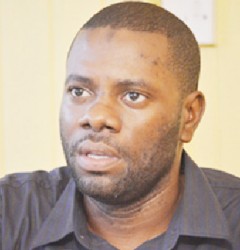By Jeff Trotman
Residents of Moblissa, a farming community on the Linden Soesdyke Highway, are being encouraged to sign two petitions for the Education and Health departments of the Region Ten administration to be responsible for the respective departments within the community.
Already, an official request has been sent to the Education Ministry for the Moblissa Primary School to be managed by the Education Department of the Regional Democratic Council (RDC) of Region Ten, Regional Chairman Sharma Solomon told Moblissa residents at a recent community meeting.
“We hope to have this matter resolved in the new term,” Solomon said, while noting that the issue of Region Ten becoming more active in matters relating to the school was raised because a number of complaints had been made to the Region Ten administration.

He, however, explained that the request would be strengthened if the residents signed a petition for the school to be brought under the administration of the Region Ten RDC as soon as possible “because it will bring a level of doing business whether it is school registration and other issues within the school that can be addressed from Linden, which is just a few miles away, rather than having to go all the way to Georgetown.”
He said it has also been suggested that the same should be done for the Health Clinic at Moblissa. The Regional Chairman added that Moblissa residents stand to benefit more from Region Ten, which is smaller than Region Four but has a lot of medical and health outreach programmes to communities on the Berbice, Demerara and Essequibo rivers.
Noting that Moblissa is located in a unique position on the boundary between regions Ten and Four, Solomon said the two regional administrative bodies have partnered on many occasions to address Moblissa’s issues. He also noted that most of the teachers at the Moblissa School reside in Linden, which is no more than a casual 15 to 20-minute drive away.
Reiterating that Moblissa acts as a buffer zone on the boundary between Region Ten and Region Four, Solomon said the Region Ten RDC is interested in representing people. “Once we have people come to our area with concerns, you can be certain that those concerns will be addressed, whether those concerns are education, infrastructure, welfare, (and) health,” he noted.
Agriculture
During his discourse, Solomon opined that agriculture could be buoyant in Region Ten, particularly at Moblissa, which was once a prime agricultural area, producing milk and other fresh foods for the Region and the country.
Stating that past agricultural success at Moblissa had resulted from the cooperative efforts of people who came together, Solomon added that renewed effort is being made to form a cooperative “under professional management.”
He said that his recent trip to Mainland China made him intimately aware that Chinese have their eyes on agricultural land in Guyana and he cautioned the Moblissa farmers that when the Chinese agriculturalists come to Guyana the local farmers will not be able to compete with them.
Stressing that some Chinese already occupy massive tracts of land in the Berbice River that they intend to cultivate for export, Solomon said it is likely that a lot of their produce will hit the local market very cheaply to the disadvantage of local farmers.
To offset such a situation, Solomon is advocating that local farmers come together and pool their resources, thereby compiling joint collateral along with their labour to engage in joint venture agricultural production with the Chinese.
“You ain’t got to like me,” he said. “Me ain’t got to like you. You ain’t got to be the same race as me. We ain’t got to be the same party affiliates. We ain’t even got to pray to the same God.
But at the end of the day, we have the same intention as farmers, which is to produce food. And if only on that common trend, we find a reason to come together, you ought to come together because if you don’t … it won’t be long before you are left holding big pieces of land with nothing to do with it. That is the reality,” Solomon concluded.





